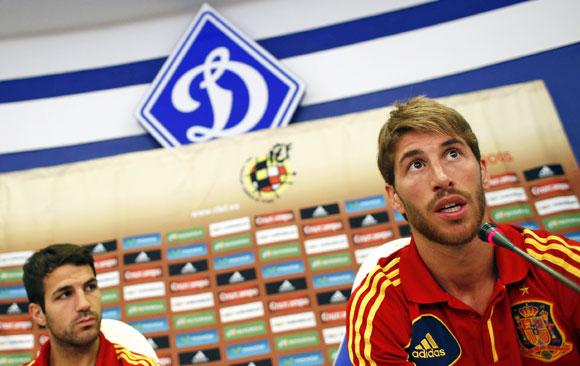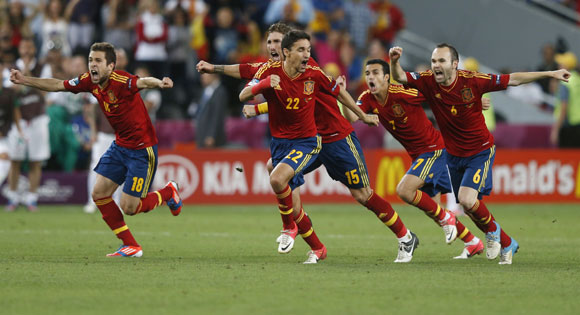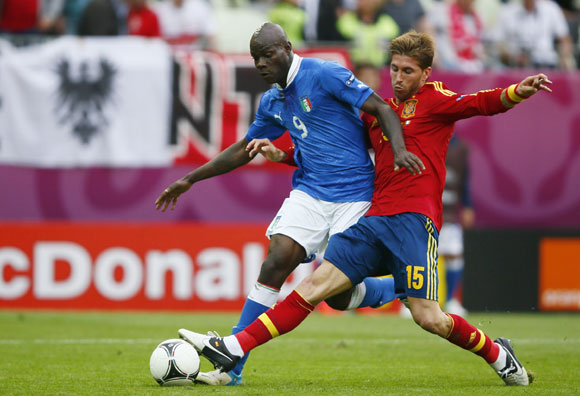 | « Back to article | Print this article |
'The winners will be deserving champions'
Soccer's aristocrats will compete for the continent's crown on Sunday when Spain seek to extend their domination of Europe against a revitalised Italy who threaten to end their reign.
Between them Spain and Italy have produced 25 European champions at club level but this will be the first time their national teams have met for the European Championship.
Few would question their places in the final have been earned.
"The winners will be deserving champions," said Spain midfielder Cesc Fabregas. "I think we've been the two most consistent teams at the tournament."
Italy are four-times World Cup winners, most recently in 2006, while Spain are aiming for a unique achievement of three consecutive major titles following their wins at Euro 2008 and the World Cup two years ago.
Spain's success has been built on impressive possession football
While Vicente Del Bosque's success with Spain has been built on a water-tight defence and impressive possession football, Italy have reached the final thanks to positive, dynamic play and a potent attack led by the temperamental talent of Mario Balotelli which saw them upset Germany in the semi-finals.
Spain's, short passing Tiki Taka method has brought remarkable results - no European team since West Germany in the early 1970's have reached the final of three major tournaments in a row.
But the 'Spanish era' will in many ways be defined by how they cope with a surprisingly exciting Italian team on Sunday.
An unprecedented third title, with powerhouses Germany and the Netherlands having already been dispatched in finals, would secure Spain's place among the greatest teams of all time.
But a defeat, at the end of a tournament in which they have rarely managed to raise the pulses of fans, would lead to a more modest evaluation of La Roja's place in the game's hierarchy.
'The players are tired'
The teams arrive in the Ukrainian capital in differing moods.
While Spain scraped into the final via a penalty shootout win over Portugal after they were held to a 0-0 draw after extra-time, Italy are on a high after their surprise 2-1 victory over a highly-fancied Germany.
Following their European and World Cup successes, Spain have more experience at this level and more quality on paper but they have looked a little jaded and their Del Bosque acknowledged fatigue was an issue.
"The players are tired. We're at breaking point.
"But they are used to this all season and I hope they get in shape for the final," he said.
'We have improved, both physically and psychologically'
After an energetic display against Germany, the Italy have some recovery of their own to do, with one day less rest than Spain but their mood is one of exhilaration after Balotelli's double earned them a place in the final that few predicted.
The Italians came into the tournament with few expectations after their dreadful early exit from the World Cup in South Africa and some patchy pre-tournament displays.
But coach Cesare Prandelli has managed to do what every national team coach hopes for in the short timeframe of tournament football - develop a club team spirit.
The two teams met in the group stage with the game ending 1-1 after Fabregas cancelled out Antonio Di Natale's opener.
"We haven't to be afraid of them," said Prandelli noting his team was stronger than they were for the opener in Gdansk. "We have improved, both physically and psychologically".
While Spain's superb passing ability frequently leads to games where they dominate possession, Portugal showed in the semi-final that hard pressing can knock them off their rhythm.
Italy did exactly that against Germany and are unlikely to sit back and let the Spaniards dictate the tempo.
'We have to try neutralise the Italian midfield'
The final also provides an interesting contrast in tactical approaches with Spain frequently playing without a recognised striker while Italy have a classic centre-forward in the form of Balotelli supported by the impish Antonio Cassano.
With poacher Di Natale likely to start on the bench, the Azzurri have plenty of firepower which they will need against a team that have not conceded a goal in their last nine knockout stage games in the World Cup and European Championship.
Allied to that stingy defence, Spain so often control the midfield thanks to the majestic Xabi Alonso and Xavi but they will be up against one of the masters in the centre of the park in Italy's Andrea Pirlo.
"We have to try neutralise their midfield as Pirlo is the player that always takes control of the match," said Fabregas.
Italy last won the European Championship in 1968 while Spain are looking for their third Euro title, following their first success in 1964, to add to their solitary World Cup.

© Copyright 2024 Reuters Limited. All rights reserved. Republication or redistribution of Reuters content, including by framing or similar means, is expressly prohibited without the prior written consent of Reuters. Reuters shall not be liable for any errors or delays in the content, or for any actions taken in reliance thereon.




